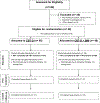Evaluating the combination of a Brief Motivational Intervention plus Cognitive Behavioral Therapy for Depression and heavy episodic drinking in college students
- PMID: 31855009
- PMCID: PMC7064381
- DOI: 10.1037/adb0000538
Evaluating the combination of a Brief Motivational Intervention plus Cognitive Behavioral Therapy for Depression and heavy episodic drinking in college students
Abstract
[Correction Notice: An Erratum for this article was reported in Vol 34(2) of Psychology of Addictive Behaviors (see record 2020-16883-001). In the original article the order of authorship was incorrect. The correct second and third authors should appear instead as Brian Borsari and Jennifer E. Merrill.] Heavy episodic drinking (HED) and depressive symptoms often co-occur among college students and are associated with significant impairment. However, evidence-based treatments for these common co-occurring conditions are not available for college students. The current study compared the effectiveness of a treatment combining Cognitive-Behavioral Therapy for Depression and Brief Motivational Interviewing (CBT-D + BMI) versus Cognitive-Behavioral Therapy for Depression (CBT-D) alone among 94 college students with HED and depressive symptoms. Both treatment programs were associated with significant reductions of similar magnitude in HED, alcohol-related problems (ARP), and depressive symptoms at the end of treatment and at the 1-month follow-up assessment. Moderation analyses indicated that, among college students with fewer depressive symptoms at baseline, CBT-D was associated with greater sustained reduction in heavy drinking relative to CBT-D + BMI at the 1-month follow-up. Although the study did not include a no-treatment condition, the magnitude of improvement during treatment in both groups was greater than what is expected with passage of time. Although clinicians in college counseling centers may lack specialty training for co-occurring conditions, CBT-D is widely implemented in college settings. Our findings suggest that CBT-D may reduce both depressive symptoms and HED in college students and may be used to address a significant public health problem. (PsycINFO Database Record (c) 2020 APA, all rights reserved).
Figures



References
-
- Aiken LS, & West SG. (1991). Multiple regression: Testing and interpreting interactions. Thousand Oaks, CA US: Sage Publications, Inc.
-
- Arria AM. Caldeira KM, Vincent KB, Winick ER, Baron RA, O’ Grady Baker AL, Kavanagh DJ, Kay-Lambkin FJ, Hunt SA, Lewin TJ, Carr VJ, Connolly J. (2010). Randomized controlled trial of cognitive behavioural therapy for coexisting depression and alcohol problems: short-term outcome. Addiction, 105(1), 87–99. - PubMed

